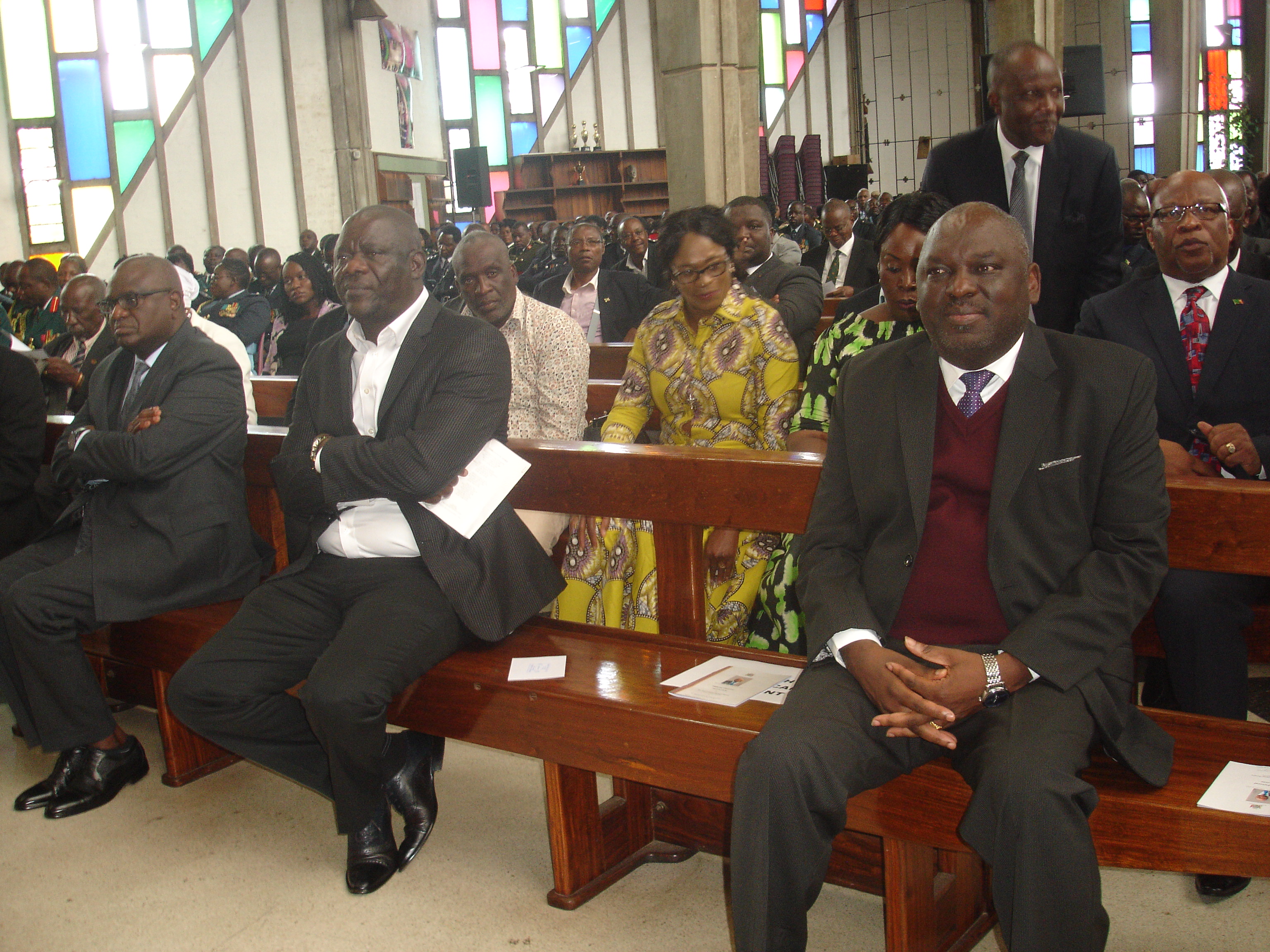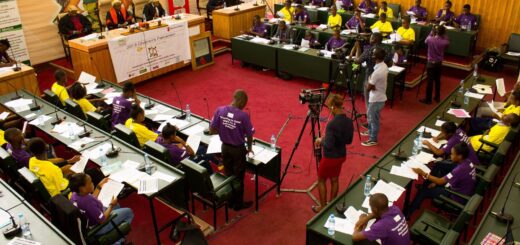King Lewanika Book Review
Notice: Undefined index: catFilterList in /home/zambi/public_html/wp-content/plugins/wp-likes/api.php on line 243

Akashambatwa Mbikusita Lewanika 2017
By Akashambatwa Mbikusita Lewanika
Freedom Park Inaugural Memorial Lecture On
KING LEWAM\NIKA THE FIRST OF BAROTSELAND 1842 – 1916:
A Legacy of Indigenous African Nationalism
Edited by Akashambatwa Mbikusita-Lewanika
This book expands into the neglected history of Pan African Cross-Border and African traditional leadership in the Southern African liberation struggle. It pays homage to African indigenous leadership, such as illustrated by the seven African Kings appointed as Honorary Presidents of Congress, at its founding at Bloemfontein on January 8, 1912. These were Dalindyebo of the Thembus; Montsioa of the Barolong; Lewanika of Barotseland; Letsie II of Lesotho Khama of Mangwato of Botswana; Marclane of Pondoland and Mopei of the Bakgatla. King Lewanika of Barotseland is the subject of the memorial lecture. Nelson Mandela, named his second son, Makgatho Lewanika, in honour of Sefako Mapogo Makgatho, the second President of the ANC and King Lewanika of Barotseland
Gervas Clay, who had served as Resident Commissioner for Barotseland between 1958 and1961 and later as Director of the Livingstone Museum from 1961to 1964. In his book My friend, Lewanika: The Life and Times of Lubosi Lewanika, Litunga of Barotseland 1842 to1916, in reference to his subject African sovereign, King Lewanika the First, Clay writes that:
“His life began in exile while his heritage lay under alien rule. He had seen the usurper defeated and annihilated and some of his royal relatives in turn enthroned in triumph and overthrown into despair and death. He had seen the country he loved torn by internecine wars and had himself barely escaped with his life into further exile. His triumphant return he knew would be without permanency of stability unless he discovered a new way to rule. … He had learnt a better way, and become popular with his people whom he had led to treaties with the dominant colonial power of the age. He died full of honour, loved and respected by his people… Leaving the heart of his country reserved to the Barotse by treaty rights and his own family secure on the throne. No African ruler of his time achieved more, and none was more regretted by all who had known him”
In SiLozi, the hybrid SeSotho-based national lingua franca commonly shared language of Barotseland the head of the national state, the King, goes by the title Mulena Yo Muhulu – meaning Supreme Ruler. In the Siluyana language, which is the Lunda-derived language of the founding leadership of Barotseland, the King goes by the title Mbumu-wa-Litunga, or simply Litunga. Following the 1884 outbreak of civil war and after the 1885 triump of being re-instated on the throne, Lubosi was referred to as Mbumu-wa-Litunga, Lewanika la Matunga Mwana Kokoma Milonga! – meaning the Supreme Lord of the Land, Unifier of Realms and Great Conqueror!
From the first communications, encounters and treaties, the British Government and its colonial authorities and agents acknowledged Litunga Lewanika as King Lewanika of Barotseland. Words of the last stanza of the Barotse National Anthem says it all:
“Imutakwandu Mulena Muhulu/ Oh, our late long serving Great King
Yo lu mu fiwe ki Muhauheli/ Given to us by the grace of God
Ha lu punyuhile, ha lu iketile / That we have survived, that we are at peace
Twenty-six years ago, the author and editor of this book, Akashambatwa Mbikusita-Lewanika, who is popularly called Aka, spear-headed the July 1990 founding of the Movement for Multi-party Democracy and was appointed as its Founder National Secretary. In this initiative, Aka was following his father and grandfather in the path of public service rooted in indigenous African nationalism but open to flowering in cosmopolitan modernity in the course of African liberation. Sixty-eight years ago, in 1948, Aka’s father, Mbikusita-Lewanika took up the challenge of taking up the Founder presidency of the Northern Rhodesia African Congress, before being placed on the throne of Barotseland as Litunga Lewanika II. One Hundred and Five years ago, Aka’s grandfather, King Lewanika the First of Barotseland, who is the subject of this book, was one of the seven African Kings appointed as Honourary Presidents and Members of the Upper House of the South African Native National Congress at its founding in 1912.
This book is based on an Inaugural Lecture that was presented by Prince Akashambatwa Mbikusita Lewanika, Aka, on 14 July 2016, which took place at the Freedom Park, Pretoria, Gauteng Province of South Africa. The Lecture focused on King Lewanika the First of Barotseland (1842-1916). Akashambatwa Mbikusita Lewanika is a grandson of King Lewanika I and a son of Litunga (King) Lewanika II, whose personal name was Mbikusita Lewanika.
Aka is the authors of the main presentation, introduction and concluding chapters of this book, which is edited by him. He has served Zambia in different capacities, including as Managing Director of the Tanzania Zambia Railway Authority. Earlier, he served as a subsidiary General Manager as well as Group Controller of Group Management Services and Group Director of Projects of the Industrial Development Corporation of Zambia. He served as a legislator, a Cabinet Minister of Science, Technology and Vocational Training, before resigning from the ministerial position in protest against creeping corruption, undemocratic tendencies and socially insensitive economic policies. He also served as Special Assistant (Political) to the state President, Chairman of the National Economic Advisory Council, Chairman of the National Governing Council of the African Peer Review Mechanism and a Commissioner of the Anti-Corruption Commission.
This book presented in the spirit of open-minded dialogue over Barotseland characterised the July 14m 2016 King Lewanika the First Memorial Lecture at Freedom Park, Pretoria, South Africa, whose proceedings form the basis for this book. In this vein, it was enlightening for discussants to have been Ndangwa Noyoo, Sitwala Imenda and Siphamandla Zondi. Two of these intellectual giants of Africa, together with John Makala Lilemba, have agreed to expand upon what they had too limited time to express during the Memorial Lecture event, as their chapter contributions in this book.
Prof. Ndangwa Noyoo, University of Johannesburg contributes the Prologue and a Chapter on “Lewanika: A Great African King Ahead of His Times.” Prof. Sitwala Namwinji Imenda, University of Zululand had written a Chapter on “Which Way Barotseland: Inheritance, Experience, Reaction and Road Map.” Dr John Makala Lilemba, currently of the University of Barotseland and formerly of the University of Namibia, has written the Chapter on “King Lewanika’s 1884 Flight to Mashi: A Historical Perspective and Lessons Learnt. For more balance and comprehensiveness, the book also includes contributions from scholars, journalists and activists, such as Eng. Mutungulu Wanga and Sibeta Mundia.
This book challenges readers to question the popular narrative of African decolonization, staring those given the power transfer instruments by departing European colonial powers. It presents a continuation of dialogue over options for a re-decolonisation towards approached to national and continental unity that accommodates diversity rather than that imposes unity through regimentation. They are challenged to consider options of governance that democratize and modernize without uprooting indigenous African governance systems. They are exposed to the rarely exposed fact that, in the history of the African liberation struggle, there are two African nationalisms – one indigenous and traditional, the other non-indigenous and populist.
chanism and a Commissioner of the Anti-Corruption Commission.
This book presented in the spirit of open-minded dialogue over Barotseland characterised the July 14m 2016 King Lewanika the First Memorial Lecture at Freedom Park, Pretoria, South Africa, whose proceedings form the basis for this book. In this vein, it was enlightening for discussants to have been Ndangwa Noyoo, Sitwala Imenda and Siphamandla Zondi. Two of these intellectual giants of Africa, together with John Makala Lilemba, have agreed to expand upon what they had too limited time to express during the Memorial Lecture event, as their chapter contributions in this book.
Prof. Ndangwa Noyoo, University of Johannesburg contributes the Prologue and a Chapter on “Lewanika: A Great African King Ahead of His Times.” Prof. Sitwala Namwinji Imenda, University of Zululand had written a Chapter on “Which Way Barotseland: Inheritance, Experience, Reaction and Road Map.” Dr John Makala Lilemba, currently of the University of Barotseland and formerly of the University of Namibia, has written the Chapter on “King Lewanika’s 1884 Flight to Mashi: A Historical Perspective and Lessons Learnt. For more balance and comprehensiveness, the book also includes contributions from scholars, journalists and activists, such as Eng. Mutungulu Wanga and Sibeta Mundia.
This book challenges readers to question the popular narrative of African decolonization, staring those given the power transfer instruments by departing European colonial powers. It presents a continuation of dialogue over options for a re-decolonisation towards approached to national and continental unity that accommodates diversity rather than that imposes unity through regimentation. They were challenged to consider options of governance that democratize and modernize without uprooting indigenous African governance systems. They were exposed to the rarely exposed fact that, in the history of the African liberation struggle, there are two African nationalisms – one indigenous and traditional, the other non-indigenous and populist.
For comments and responses reach Comrade Akashambatwa Mbikusita-Lewanika on 0977842931 or akalewanika2@gmail.com





















